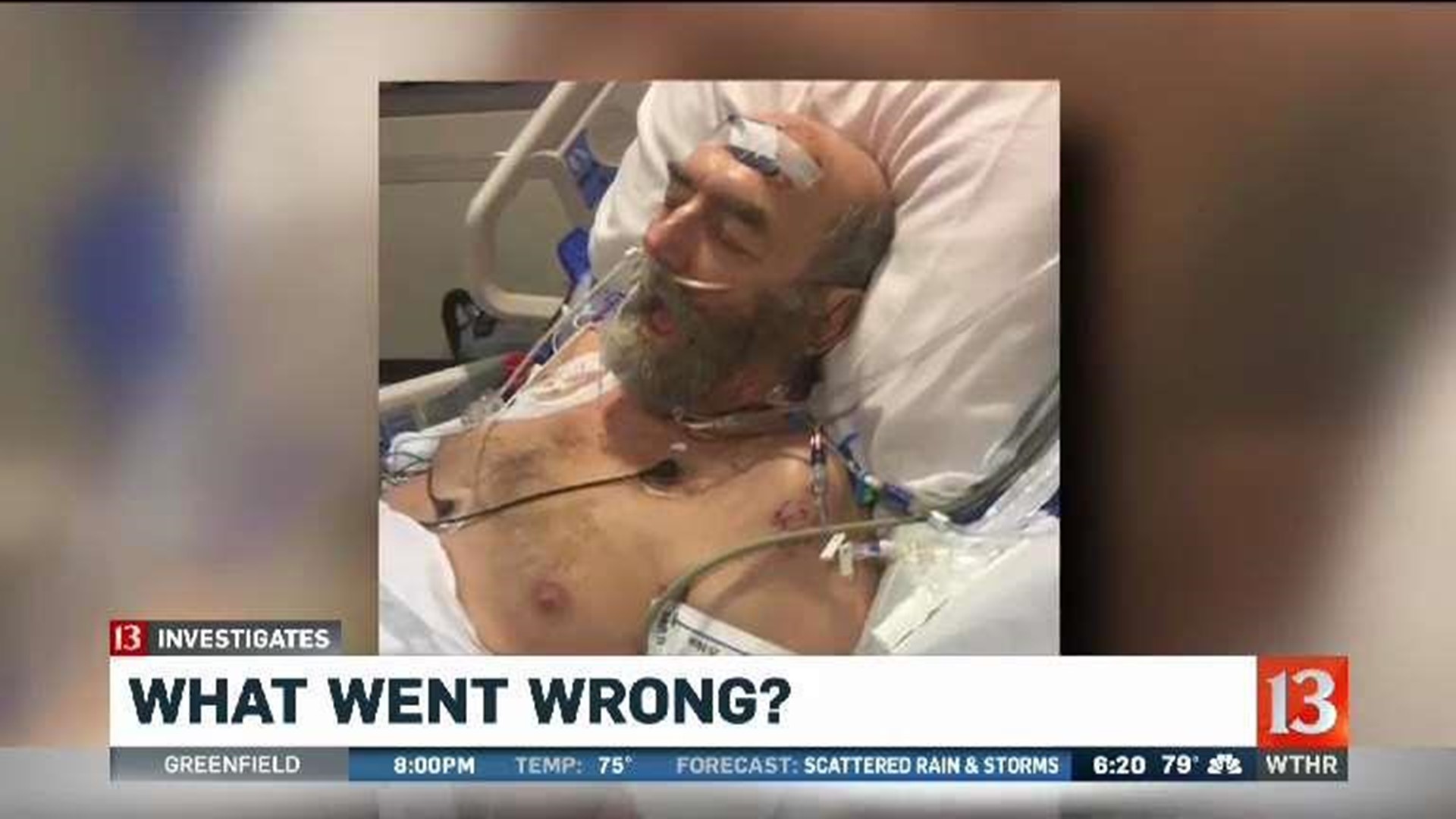FRANKLIN, Ind. (WTHR) — Traci Dearth was enjoying a family vacation in Florida when she heard a severe weather warning on her cellphone.
“My Channel 13 app continued to go off because of all the storms back home, but I didn’t think much about it at the time. I just had no idea,” she said.

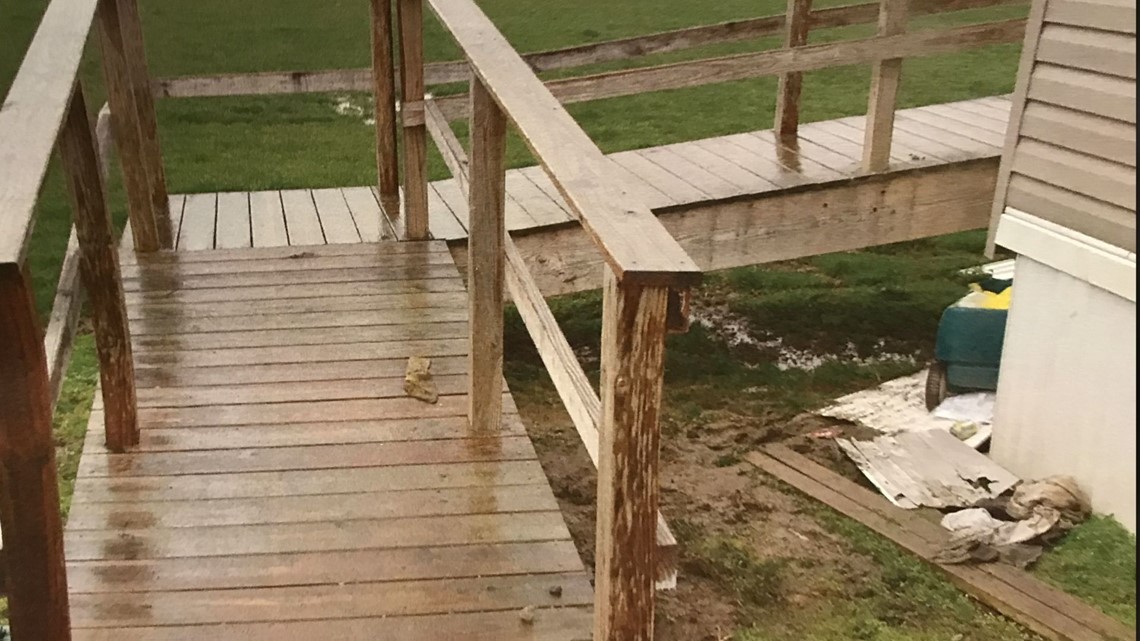
What Dearth didn’t realize was her 70-year-old father was outdoors, helplessly seeking shelter from the severe thunderstorms that brought hail, lightning, high winds and flooding to central Indiana.
The wheelchair-bound veteran with dementia was supposed to be safe inside a nursing home. Instead, he was fighting for his life, abandoned by the people who Dearth trusted to care for him.
“They had one job and that was to take care of him for seven days, and they didn’t do that,” Dearth told WTHR. “He suffered so much. It’s been a year and I still don’t understand it.”
She is now demanding answers from the Roudebush VA Medical Center, a nursing home and a local cab company. All three are accused of negligence that eventually contributed to the death of Gerald Bowers.
“This is a horrible tragedy that should have never happened,” said attorney Mark Ladendorf, whose law firm has filed two lawsuits related to Bowers’ care. “This is a story the community should hear about. Somebody needs to be held responsible, so this never happens again.”
The getaway plan

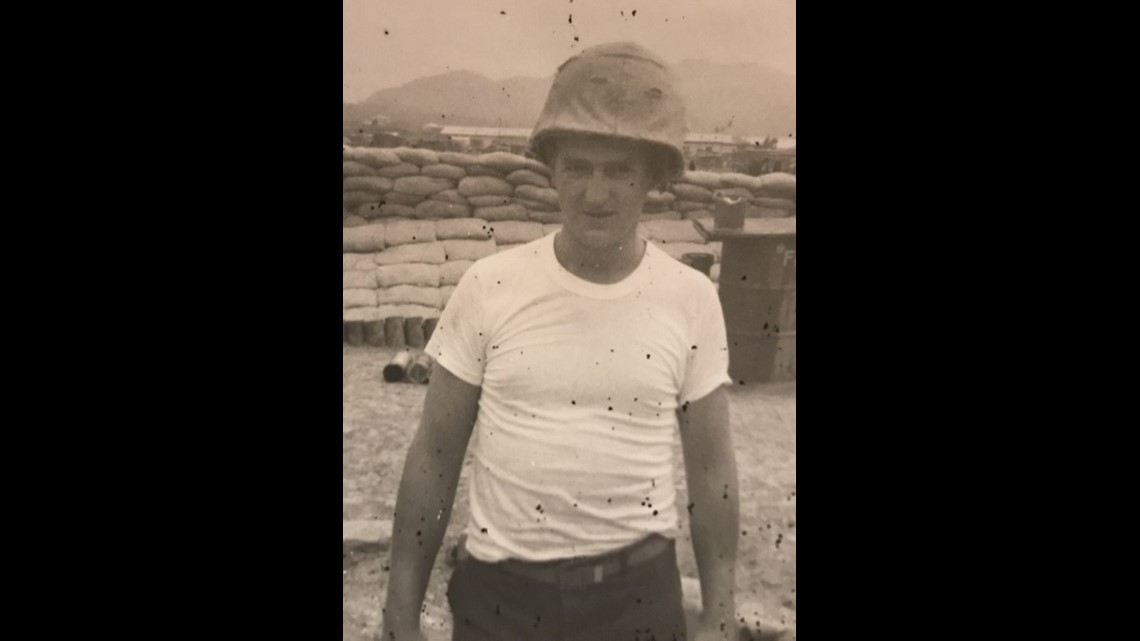
Gerald Bowers grew up in Indianapolis. After graduating from Manual High School, he enlisted in the Marine Corps and fought in Vietnam. Bowers then returned home and raised a family. The retired insurance agent coached and umpired baseball, enjoyed fishing and traveling, and loved spending time with his 16 grandchildren and great grandchildren.
“He would give you the shirt off his back,” said Dearth, as she flipped through family photos showing her father. “Just a really big heart and a good guy. Everyone loved him.”
Like many seniors, Bowers began to suffer significant health problems as he got older. Diabetes affected his vision and required his right leg to be amputated below the knee in 2014. He also had heart disease and showed signs of dementia. Wanting to help care for her father, Dearth and her husband set up a small house for Bowers in the front yard of their Franklin home.
“He was able to live alone, with us being very close,” said Dearth. She saw her father every day, providing meals and making sure he got to his three weekly dialysis appointments at the VA medical center in Indianapolis.
In 2016, a VA social worker suggested Dearth take a much-needed break from her caretaking responsibilities, explaining the VA would coordinate short-term respite care for Bowers so Dearth could take a family vacation. She reluctantly accepted the offer, taking a week-long vacation to Florida.
“It worked out well,” Dearth recalled. “The VA social workers set everything up and paid for it. They found a nursing home for my father and took him to his appointments. They took good care of him.”
After the successful trip to Florida, Dearth planned another family vacation the following year. The VA again coordinated care for her father, arranging a week-long stay for Bowers at the Decatur Township Center nursing home on the southwest side of Indianapolis. The VA hired Yellow Cab to transport Bowers to and from his dialysis treatments. Dearth double checked all the arrangements before she left for Florida in March 2017.
“I called VA travel several times. We talked to Yellow Cab several times. I wanted to make sure everyone was aware we were not going to be home so not to take him there,” Dearth told 13 Investigates. “Everyone said ‘Oh, we know our job. We got this. Go enjoy your family.’”
From Florida, Dearth checked in with her father several times. Everything seemed to be going well -- until she got an urgent call from the VA.
“No one knew where he was”
When her phone rang Friday morning, on the final day of her vacation, Dearth recognized the VA hospital’s general number that appeared on her caller ID.
“It was a nurse from the dialysis unit and she said, ‘Your father never showed up for dialysis,’” Dearth recalled. “I started crying and I said, ‘What do you mean?’ She told me she called the nursing home and they hadn’t seen him since Wednesday morning. She said ‘We’ll find him, honey. It’s ok. We’ll find him.’ That’s when I realized no one knew where he was.”
The 70-year-old amputee with dementia had not been seen in two days, triggering a frantic search. It ended when police found Bowers lying in a puddle of mud just outside the front door of his own home. Dearth later learned that earlier in the week, after her father’s Wednesday morning dialysis appointment, Yellow Cab dropped him off at his home in Franklin instead of taking him back to the nursing home in Indianapolis.
“They left him on the front porch and the door was locked. A 70-year-old man with one leg. They left him on the front porch … and drove away,” Dearth said with tears in her eyes.
Police did not find the disabled veteran until more than 41 hours later. His daughter says she is haunted by what happened to him during the day and a half that he was left to fend for himself.
After sitting outside for more than 24 hours, Bowers endured a powerful storm. On the night of March 29, 2017, severe weather including lightning, hail, heavy downpours and high winds swept through central Indiana, causing widespread damage.
“Part of the roof was missing. We had a tree down. We had flooding in the yard, and he was outside during all of that. No food. No medication. No shelter. Nothing,” Dearth said.

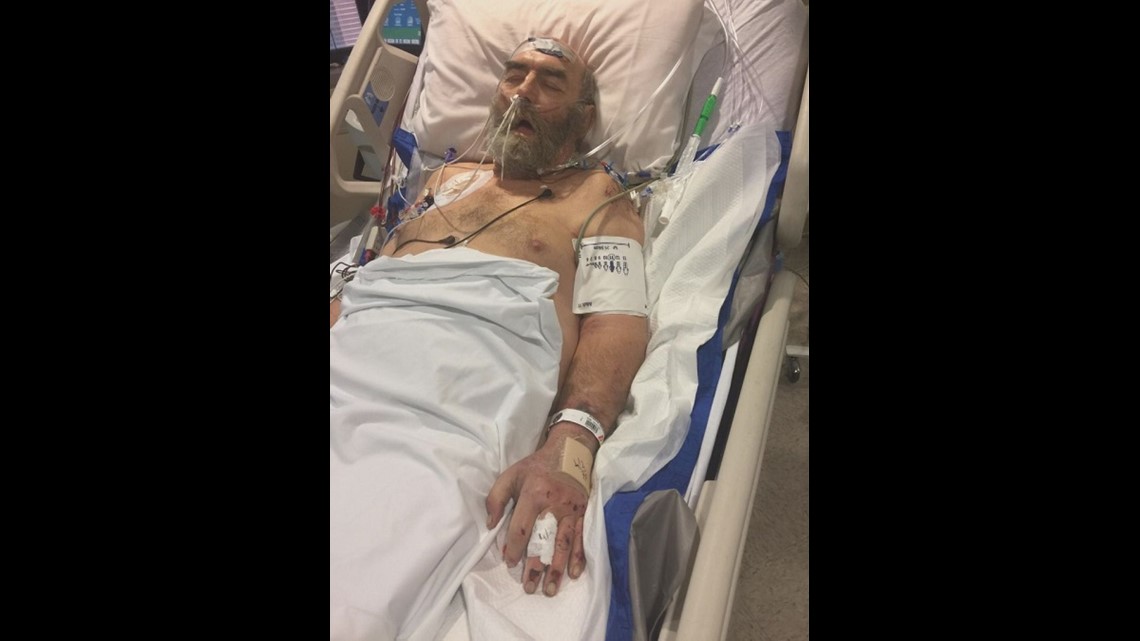
Bowers’ family believes Gerald tried to find cover under his wheelchair ramp to protect himself from the storm, but his wheelchair tipped over in the mud on top of him, trapping several of his fingers in the wheels. Dearth thought her father was safe and warm inside a nursing home. Instead, he was passed out, covered in mud and blood outside his house. It is not clear how long Bowers had been unconscious.
“The paramedics showed up and the only thing they could tell me was that he was so cold that the thermometer wouldn’t register his temperature,” his daughter said. Those paramedics rushed the Bowers to the hospital while Dearth – unable to find a flight to Indianapolis – rushed home from Florida, not knowing if her father would still be alive when she completed the 13-hour drive.
109 days of agony
When Dearth arrived at the VA medical center, she feared the worst. An emergency room doctor had already advised her by phone that trying to save her unresponsive father might not be a good idea.
“Seeing him, it was the scariest thing,” she recalls of her first moments in the intensive care unit. “There were machines all around him and tubes coming out of him. He still had dirt caked on him from lying in the mud. I went in and held his hand, and he cracked an eye and said, ‘You finally found me.’ That was hard. It broke my heart.”
Bowers’ body was covered in deep wounds – literally from head to toe. He had swallowed dirt and gravel during his harrowing night on the ground, leading to respiratory problems and a dangerous sepsis infection. Swallowing was now excruciating. Eating was nearly impossible, requiring nurses to insert a feeding tube.
It took 30 days before the proud veteran could go home from the hospital, and even then, he had to return a few weeks later because several of his wounds were not healing properly. Doctors decided it was necessary to amputate two fingers on Bowers’ left hand that had been trapped in the spokes of his wheelchair.
The long hospital stays and constant medical interventions took a toll on Gerald Bowers, who had already lost 30 pounds in two months. Dearth watched as her father’s dementia and memory lapses worsened. His heart grew weaker. Controlling his diabetes became more difficult. A foot wound suffered during his outdoor ordeal became infected, and the infection slowly spread up his left leg. Hospice was called to keep Bowers comfortable, and he spent his final days at home with family.
“He was very confused. He kept asking me, ‘What did I do to make this happen?’ And I couldn't tell him. I just couldn't make him relive that,’” Dearth said in a high-pitched voice, unable to hold back tears. “He could no longer function and do anything. He couldn't eat anymore. He just lay there every day just waiting to die.”
That day came last summer on July 17. Bowers died three and a half months after what appears to be a terrible mix-up. The Marine’s family wants to know how that mix-up happened so other veterans and their families do not have to suffer like they did.
The lawsuits
Attorney Matt Bigler remembers the day Dearth first called his law office to discuss what happened to her father.
“We’re in a business where we see bad things happen every day, but this one does stand out,” he told WTHR. “Our paralegal took the initial phone call and she came in crying after she got off the phone. It just shocks the conscience… trying to think what that would be like, you can’t even imagine it.”
Bigler has filed two lawsuits on behalf of Bowers’ family. The first lawsuit filed in Marion County Superior Court is against Decatur Township Center and its parent company Genesis HealthCare, Indianapolis Yellow Cab, and cab driver Russell Pryor. A second lawsuit against the Department of Veterans Affairs and Roudebush VA Medical Center is filed in federal court. Both lawsuits claim the defendants engaged in negligence that negatively impacted Bower’s health and contributed to his death.
“He went through tremendous pain and suffering which is what this action is about,” Bigler said. “We’re not saying Mr. Bowers would have lived another 20 years, but what happened did take years off his life.”
Attorney Mark Ladendorf, who is also representing the veteran’s estate, believes each of the defendants shares blame for the tragic mistakes that resulted in Bowers’ injuries.
“This is a horrible tragedy that should have never happened,” Ladendorf said. “It happened as a collective matter between all of the defendants having to drop the ball that led to this tragedy. Each one of them had an integral part and responsibility to take care of Mr. Bowers, and they didn't.”
In the lawsuits, Bigler argues the cab company and its driver are liable for transporting Bowers to his home after detailed arrangements had been made to take him to the nursing home.
Timeline of Key Events
| March 23, 2017 | Gerald Bowers begins week-long stay at Decatur Township Center nursing home. (Plaintiff attorneys) |
| March 24, 2017 | Yellow Cab taxi takes Bowers to/from Roudebush VA Hospital for 1st kidney dialysis appointment. (Plaintiff attorneys) |
| March 27, 2017 | Taxi takes Bowers to/from hospital for 2nd kidney dialysis appointment. (Plaintiff attorneys) |
| March 29, 2017 | Taxi picks up Bowers at nursing home for 3rd dialysis. (Plaintiff attorneys, ISDH record) |
March 29, 2017 (10:15 a.m.) | Bowers arrives at hospital. (Plaintiff attorneys) |
March 29, 2017 (4:20 p.m.) | Taxi picks up Bowers at hospital. (Plaintiff attorneys) |
March 29, 2017 (5:15 p.m.) | Taxi drops off Bowers at his Franklin home. He does not have keys for locked door. (Plaintiff attorneys) |
March 29, 2017 (7:30 p.m.) | Nursing home cannot locate Bowers. Declares “immediate jeopardy” situation. (ISDH record) |
March 29, 2017 (7:34 p.m.) | Nursing home calls hospital to locate Bowers. Nurse “left a generic voicemail” asking for return call. IN health dept report says there is no record a return call was received.(ISDH record) |
March 30, 2017 (8 a.m.) | Nurse at nursing home enters into computer that Bowers was admitted to hospital. (ISDH record)(Note: He was not admitted.) |
| March 30/31, 2017 (overnight) | Strong storms move through area. Rip off part of roof, topple a tree and cause flooding near Bowers’ home. |
March 31, 2017 (10 a.m.) | Hospital calls nursing home after Bowers fails to arrive for dialysis. (ISDH records) |
| March 31, 2017 | Hospital calls Traci Dearth to say her father cannot be located. (Dearth interview) |
March 31, 2017 (10:45 a.m.) | Police find Bowers unresponsive on ground outside home. Medics take him to hospital in critical condition. (Plaintiff attorney, ISDH records) |
| April 28, 2017 | Bowers goes home from hospital. (Plaintiff attorneys) |
| May 30, 2017 | Doctors amputate two fingers from Bowers’ left hand. (Plaintiff attorneys) |
| July 7, 2017 | Bowers passes away. |
The lawsuit claims Indianapolis Yellow Cab and the driver were negligent for “failing to abide by protocol in transporting … Bowers by leaving him unattended, outside, at a vacant and locked home with the knowledge that Bowers did not have access into the home and could not care for himself.”
Bigler says the nursing home was negligent and engaged in medical malpractice for not confirming Bowers whereabouts when he never returned after his Wednesday dialysis appointment. He believes the VA shares responsibility for coordinating Gerald's care, which fell apart while his family was out of town.
“As a direct and proximate result of Defendant’s negligence, Mr. Bowers sustained serious and permanent personal injuries in and about his body, was forced to endure pain, suffering, and mental anguish, suffered a loss of the enjoyment of life, and suffered a diminished life expectancy,” the federal lawsuit says.
Bowers’ estate is seeking $10 million in damages from the VA and a non-specified amount from the other defendants. Unless a settlement is reached, it will be up to a jury to determine whether the defendants’ conduct was “grossly negligent, willful, wanton, and manifested heedless indifference for the safety” of Bowers.
“All three companies had one job and that was to take care of him for seven days, and they didn’t do it,” Dearth said, wiping away more tears. “We should have picked him up the same way we dropped him off and that didn’t happen. It’s just changed everyone’s life. It’s not the same. I still wake up thinking it was all a dream. It wasn’t a bad dream. It was real … and we want changes to be made so no one ever has to go through what we went through.”
Cab company, nursing home, VA remain silent
13 Investigates contacted the Roudebush VA Medical Center, Decatur Township Center and Indianapolis Yellow Cab to speak about the lawsuits and what led to Bowers’ injuries. All of the defendants declined interviews, stating they are unable to discuss the case because of the current lawsuits.
“We are committed to passenger safety, as well as good corporate citizenship through community involvement. Due to pending litigation we are unable to offer any further comment on the specific details of this matter,” said John Kautzman, an attorney representing Yellow Cab.
VA hospital spokesman Pete Scovill would not answer questions but sent WTHR the following statement:
"It is with great sadness that Veterans mourn when a fellow Veteran passes away. One out of every four staff members providing health care for Veterans here in Indianapolis, is a Veteran. Our motto of “Veterans caring for Veterans” is taken seriously. Circumstances that cause a Veteran Family concern are indeed unfortunate. We take every opportunity to review the circumstances when an unexpected incident takes place and will continue our daily quest to improve. Our most sincere condolences go out to this family. Hopefully, they are able to take comfort, knowing that their loved one served this country with dignity and honor."
Supervisors at Decatur Township Center also refused to talk about Bowers’ care.
"At this time, we don't have a comment ... There is an ongoing lawsuit," said Megan Gaylor, the nursing home’s executive director.
But documents obtained by 13 Investigates shed some additional light on some of the mistakes that resulted in Bowers being left unattended at his home for more than 40 hours – and what’s being done to prevent similar situations in the future.
Phone call that never happened
After the incident, Decatur Township Center filed a Statement of Deficiencies and Plan of Correction with the U.S. Department of Health and Human Services Centers for Medicare and Medicaid Services.
That 13-page report, required by state and federal law, states a second shift nurse at the nursing home called the VA at 7:34 p.m. on Wednesday, March 29, 2017, to check on Bowers because he had not yet returned to the facility three hours after he was expected.

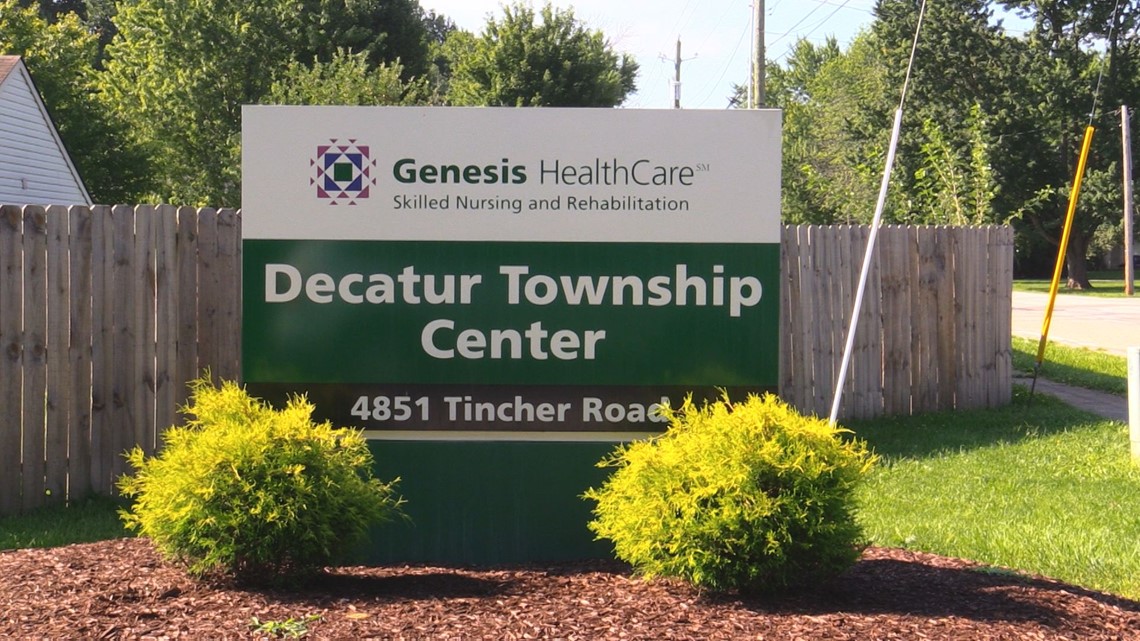
The report shows “the second shift nurse left a generic voicemail to contact facility, and there was no documentation that a return call from the VA dialysis center was received. According to the second shift nurse she had made an ‘educated judgement that the resident was hospitalized due to the change of condition prior to the going to dialysis.’” (Bowers had a low blood pressure reading earlier that morning, but the VA requested he be transported for his dialysis treatment anyway, according to the report.)
At approximately midnight, a third shift nurse at Decatur Township Center notified a nursing program educator (NPE) that Bowers still had not returned. Six hours later, on Thursday morning, notes show “shift nurse reported to first shift nurse that resident was admitted to the hospital.”
It is not clear how or why that statement was made since, according to the report, it does not appear the nursing home had received such confirmation from the VA Hospital. That same morning, the NPE wrote in a daily follow up to “check on the resident at the VA,” but there is no information to suggest that checkup happened.
The report states “[Bowers’] clinical records lacked documentation the VA had been contacted nor the whereabouts of [Bowers] had been known.” Nearly 24 more hours passed before nursing home staff discovered Bowers was not where they thought he was.
On Friday, March 31, at 10:00, the HHS report states “RN unit manager received a call from the VA dialysis center wondering where resident was.” The NPE then called the VA and learned there was no record Bowers had been admitted.
The report says when the nursing program educator from Decatur Township Center learned Bowers had been mistakenly transported to his home, a social worker drove her to the house where the NPE found him on the ground. He was breathing with only a fair pulse. According to notes, Bowers was moaning and unresponsive to questions before medics transport him to the hospital in critical condition. Physician notes stated he had a core body temperature of 77 degrees and required a tube placed down his throat to maintain an open airway.
Following the incident, Decatur Township Center told the Department of Heath and Human Services that its corrective action plan would include re-educating nurses to ensure all VA residents who have outside medical appointments are tracked. If a resident does not return within one hour after an estimated arrival time, the charge nurse will call the contracted transportation company and appointment location to establish the location of the resident. Nurses will complete a checklist each shift to monitor the return of all VA residents using non-medical transports, and the nursing home’s head nurse will review the facility’s midnight census reports to ensure residents are accounted for.
It is still unclear what changes, if any, the VA and Yellow Cab have made in response to the Bowers incident. Why the veteran was transported home instead of to the nursing home is also unknown. In the coming months, Bigler will be conducting depositions that may shed more light on the tragic mistake.
"Clearly there were many errors. We hope to find out what balls were dropped and when, so we can figure out who is at fault for this,” he said.

